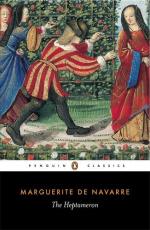This manner of life lasted for a long time; but as the King was a person of public condition, he could not conceal his love sufficiently well to prevent it from coming at length to the knowledge of every one; and all honourable people felt great pity for the gentleman, though divers malicious youths were wont to deride him by making horns at him behind his back. But he knew of their derision, and it gave him great pleasure, so that he came to think as highly of his horns as of the King’s crown.
One day, however, the King and the gentleman’s wife, noticing a stag’s head that was set up in the gentleman’s house, could not refrain in his presence from laughing and saying that the head was suited to the house. Soon afterwards the gentleman, who was no less spirited than the King, caused the following words to be written over the stag’s head:—
“Io porto le corna,
ciascun lo vede, Ma tal le porta che no lo
crede.”
(8)
8 “All men may
see the horns I’ve got, But one wears horns
and knows it not.”
When the King came again to the house, he observed these lines newly written, and inquired their meaning of the gentleman, who said—
“If the King’s secret be hidden from the subject, it is not fitting that the subject’s secret should be revealed to the King. Be content with knowing that those who wear horns do not always have their caps raised from their heads. Some horns are so soft that they never uncap one, and especially are they light to him who thinks he has them not.”
The King perceived by these words that the gentleman knew something of his own behaviour, but he never had any suspicion of the love between him and the Queen; for the more pleased the latter was with the life led by her husband, the more did she feign to be distressed by it. And so on either side they lived in this love, until at last old age took them in hand.
“Here, ladies, is a story by which you may be guided, for, as I willingly confess, it shows you that when your husbands give you bucks’ horns you can give them stags’ horns in return.”
“I am quite sure, Saffredent,” began Ennasuite laughing, “that if you still love as ardently as you were formerly wont to do, you would submit to horns as big as oak-trees if only you might repay them as you pleased. However, now that your hair is growing grey, it is time to leave your desires in peace.”
“Fair lady,” said Saffredent, “though I be robbed of hope by the woman I love, and of ardour by old age, yet it lies not in my power to weaken my inclination. Since you have rebuked me for so honourable a desire, I give you my vote for the telling of the fourth tale, that we may see whether you can bring forward some example to refute me.”




